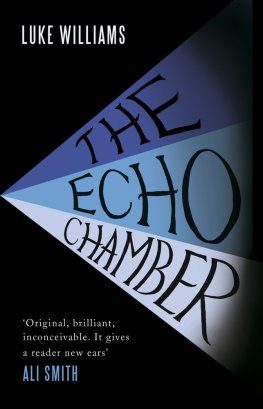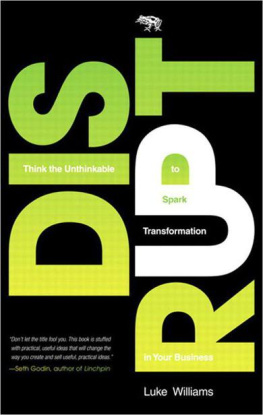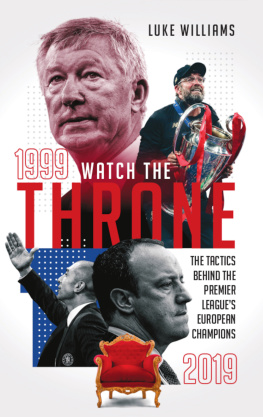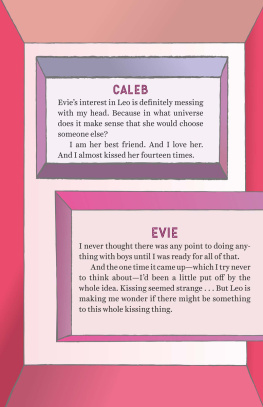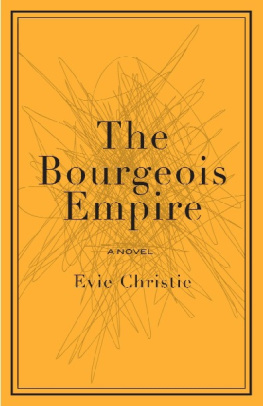Luke Williams
The Echo Chamber
Luke Williams was born in 1977. He grew up in Fife, Scotland, and now divides his time between Edinburgh and London. The Echo Chamber is his first novel.
Who are you?
My name is Evie Steppman.
Where were you born?
Childrens Hospital, Lagos.
When?
2 August 1946.
In any special circumstance?
I was late.
How late?
Two months.
Go on.
I was not ready to emerge after the allotted time. Happy in the womb, free from worldly concerns and the rules of men, I felt no impulse to move on. I possessed the foetal licence indeed, the prerogative to gambol. Trembles met with, Do you feel him kick, dear? or, Certainly a strong one. Hands, ears and lips were pressed to my mothers stomach. Its like a factory in there, joked my father, I can hear clattering machinery, a baby-construction works. I delighted in my formlessness. Half-fish, half-girl a mermaid I rolled as if free from gravity. I luxuriated in the confusion. Such licensed disorder.
[Pause.]
How did your belated arrival affect your life?
It killed my mother.
Yes?
It caused my father to lose his faith in Progress.
Yes?
It gave me the power of listening.
How so?
In the evening, when each days duty as District Officer was complete, my father crouched beside my mother and chattered to her swollen belly. Kneeling awkwardly on the hardwood veranda floor, his hands gripping the reclining chair upon which Mother lay, he read me Dickens and Darwin, the fairy tales of Oscar Wilde, Typhoon and Treasure Island. He recited Housman and the Lords Prayer. I learned how the elephant got his trunk, the principles of Indirect Rule. We entered with El-Edrisi into distant lands where fantastic races lived. We accompanied Mungo Park north towards Timbuktu and, with Sir Frederick Lugard, sojourned at Lokaja. He discoursed on zoos and craniology. He talked of masks, of goblins, turning from myth to biology to Christmas. One evening, bent over Mothers stomach, as he attended to the names of the seven seas, in between the Indian and the Aegean, I punched him on the nose. Undeterred, he opened the Bible and recited the seven deadly sins. Then he told me of the colour-filled nights of Bruno Schulz. While I turned somersaults and figures-of-eight, Father worked through the volumes that informed his inconstant mind.
And perhaps it was the monotony of this persistent address (accompanied by the tick-tock of Fathers pocket watch, which invariably slipped from its niche to rest an inverse stethoscope on Mothers belly) that bred in me the will to listen. He spoke in the most formal and stilted manner as if I were a schoolboy his voice loud and always earnest. Each history, novel, treatise sounded similar, and I found it hard to distinguish H. Rider Haggard from Aunt Phoenes letters, the Great Chain of Being from the Nocturama at Edinburgh Zoo.
Week after week he persisted with this schooling. I felt the discomfort of one who is compelled to sit through a long and awkward joke. Setting out to tell a story, which may have been a fine one, Father invariably failed. The world he brought me via my mothers stomach was vibrant, but devoid of nuance, a world in which every legend and report, every plot and character sounded alike.
How strange it was, then, to find, in the outside world contrast, division, difference. I knew that outside my mother a large territory existed. Six months into my gestation, my ears started to pick out sounds from the amorphous hum of Lagos. I recognized, for instance, the murmur of the sea. This was easy, since I grew in moon cycles. I perceived the sharp salute of gunfire and the chimes of Lagos clock, sounds I feared. Yet these scattered tones were engulfed in the coursing hum of blood, soothing to my ear, and by my fathers nightly readings. It was much later that I perfected my art of listening.
[Pause.]
You dallied in the womb because you were afraid of the outside?
I was comfy.
You were hungry for your fathers knowledge?
I never wholly understood what he was talking about. Father was pedantic but erratic. A whim might catch him and take us on an alternate inquiry. He would abandon his station beside Mother and go cycling, returning days later only to begin elsewhere. Quite simply: my father rarely finished a single lesson. Just as he was reaching the high point of his recitation, his mind failed, and he wandered from the current theme, anxious to pursue the next.
Did you enjoy your fathers readings?
They wearied me. He gave me lessons, and I wanted stories. But I listened. With frustration I listened. And as I did my ears began to develop. The more I heard, the greater my knowledge, and the keener my powers of listening became. My other senses had no time to refine themselves, for what can you see inside that dark chamber? The amniotic fluid salty, viscous and vile is the only flavour. And what to smell?
[Pause.]
Tell me about your powers of listening.
I am losing them. The sounds I once so clearly perceived are starting to merge; no longer can I distinguish, order and remember each noise. It is true, my hearing is still uncommonly acute. With effort I can pick out echoes of my childhood in Lagos: seated uncomfortably in my wicker swinging-basket, suspended above our immaculate lawn, which sloped towards the Lagoon, I hear the calls of Jankara market women, broadcasting the succulence of their goods with words I do not understand, so that amidst the commonality of staple foods palm oil, tilapia, yams, groundnuts and spices I fancy I hear entreaties to enter card games, river cruises, witch-hunts. The elephant grass at the edge of our garden obscures my view of Ade, our servant-boy, but I can hear him; he is making telephones from empty cans and lengths of string. In the distance the thud of leather striking wood tells me that Riley has scored another four. I hear teacups rattling, the sound of Father playing solitaire, clocks, footsteps, the bulb-horn of a goods lorry; listening harder, I hear the sound of the drivers forehead pressed against the windscreen, vibrating in time to the engine idling. In the harbour, below the mastheads, there is the clamour of men and derricks unloading soap, pots and pans, mail, saddles, a jukebox, an umbrella, tea, sugar, gin, boxes of cigars, rifles, tuxedos, steel, fireworks, brine, chocolate, camp-chairs and an elegant high-sprung dogcart made in Manchester. I hear the cries of merchant seamen and they commingle in my mind with older, less familiar voices; those of the first English explorers, the unfortunate men who not two hundred years ago sang the most sinister of sea shanties as they neared the Niger coast:
Beware and take care of the Bight of Benin
Theres one comes out for forty goes in,
and those of the slaving ships, their silent crewmen, and the barely audible dirge of their living cargo.
Yet there are disturbing lapses in my audition. I find for instance I cannot play my favourite childhood game. During the hot hours after lunch, with Iffe at the market, I would slip from the onion stand to the streets of Lagos. I recall the brightness. The smell of sweating bodies, drying fish and open sewers. I would close my eyes. The street-sounds, I found, were intelligible by my eighth year I could distinguish between the pitch of the Governors Austin 12 Tourer and Oba Adeniji Adeles Mercedes yet I detected other noises, new to my ears; noises that disturbed and delighted; noises that appeared to a maturing girl at once violent and inspired. Back home I would play out the drama of these stolen moments with my dolls. I had Red Riding Hood kiss Rupert Bear, my Victorian china doll grope with the Nigger Minstrel from America.

